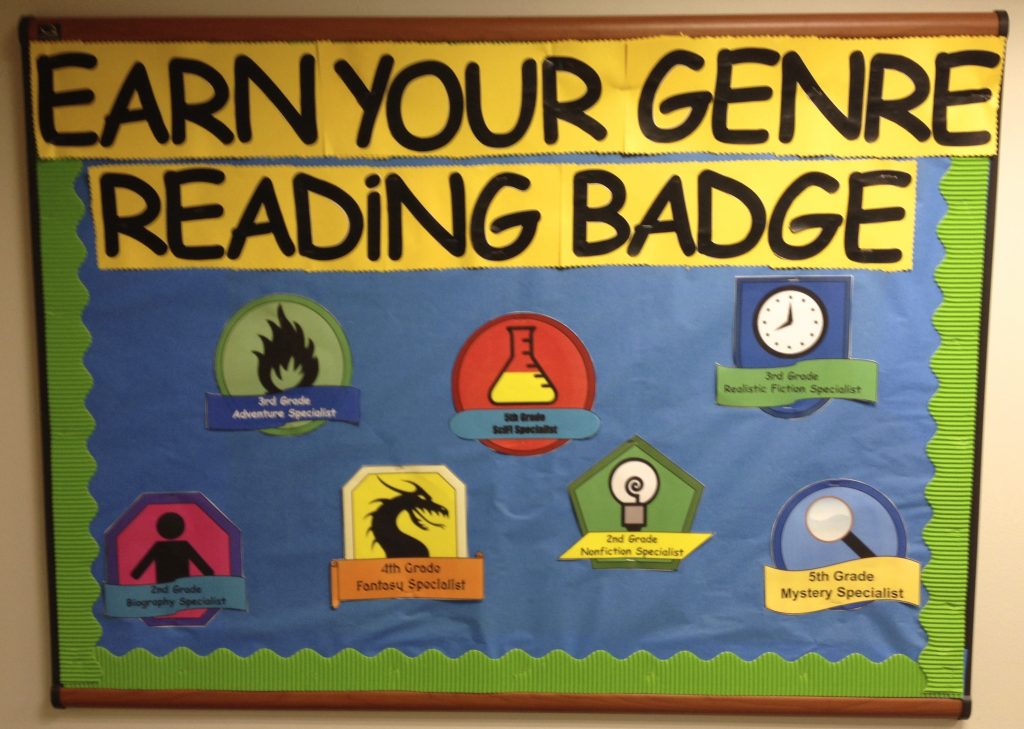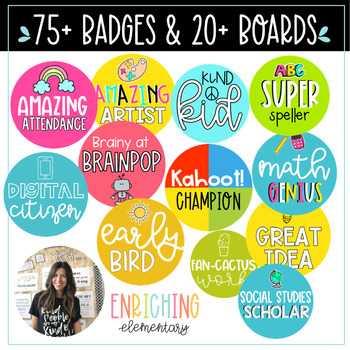I came across this article as I was researching for an online curriculum project I’m working on. The Mac Arthur Foundation defines a digital badge as “an assessment and credentialing mechanism that is housed and managed online. Badges are designed to make visible and validate learning in both formal and informal settings.” A digital badge looks similar to a Girl Scout or Boy Scout patch. The badge is small with icons and awarded when the student accomplishes a specified task or demonstrates great skill. Students can attach evidence to their digital badges and display their badges on a digital badging platform or upload them to a portfolio or website. Digital badging helps teachers recognize skills not usually highlighted in a report card or transcript, such as great leadership, collaboration, citizenship, creativity, and innovation.
Check out the original website here:https://teacherrebootcamp.com/2019/12/stemday19/
There are many different websites that can help teachers create digital badges, but this one here actually helps classes keep the badges online: https://www.badgelist.com/


This has been a popular conversation in the open educational community for some time now, including the OE Global Conference that I attended this past week. In that bent, here is one of the talks from there on this topic:
– Designing and Implementing Digital Open Badges for Success by Dr. Wayne Gibbons : https://connect.oeglobal.org/t/designing-and-implementing-digital-open-badges-for-success/400
Personally I never thought I was one for badges, but some of the more meaningful ones that have been coming out of the OEG Connect community as they launch their badges have really made me smile. Most notably of these have been that of ‘Connector Extraordinaire’ and the ‘UNESCO OER Implementation Award’. The latter is actually a real award as a part of the OE Awards, and was a clever bit of leadership and community building that came out of this year’s OE Global Conference in which the UNESCO OER Implementation Award was awarded to all the presenters for exemplary leadership in advancing the UNESCO OER Recommendation in their own practices. They write about it here: https://awards.oeglobal.org/reveling-2021-open-education-awards-for-excellence-winners/2021-unesco-oer-implementation-award-winners/ I have to say, I love that this is a community shared award, as it demonstrates that it takes a community to build what we are building around open education, as oppose to any one individual.
The LMS we use is Brightspace, where much of the traditional design was to cater to a K-12 audience. Awards and badges were a part of this design and I think, while originally seemed to be a fun and gamified way to support learning for this cohort, it began to be avidly used within higher ed institutions. The idea of creating these “micro-achievements” is a really interesting way to document skills mastered, content completion, or participation in a course. It promotes the feeling of accomplishment which can be very motivating for students. And we know that student motivation usually has positive impacts on learning. However, I’ve also read that, alternatively, they can actually be de-motivating for some when they’re used as extrinsic motivators (Reid, Paster, and Abramovich, 2015). So it’s quite important to be mindful of how they are used. I think this goes for many tools and teaching strategies. Nonetheless, I think there is potential.
Reid, A. J., Paster, D., & Abramovich, S. (2015). Digital badges in undergraduate composition courses: Effects on intrinsic motivation. Journal of Computers in Education, 2(4), 377–398.
I remember when I started using the Nike running app, and then I received a digital badge after completing x kilometres or celebrating my fastest/longest run. For a while, I used an app (Elevate) that suggested different short games to practice some skills and provided digital badges too. I love the idea of earning badges. To me, it represents recognition for the completion of an achievement. In the same way, in education environments, badges motivate students to interact with content or tasks. I also see great potential in using them. I believe the desire to obtain them drives action, but I’m not sure if they really do the work of increasing intrinsic motivation for learning. As another learning strategy, educators need to help students to understand the context better.
Badges have also been a topic of interest for post-secondary institutions over the last few years. eCampus Ontario produced Educational Technology case studies to explore the use of badges in post-secondary (i.e. professional development, faculty development, continuing education, credit and non-credit offerings, undergraduate graduate programs, and co-curricular experiences.) They published their finding as an open resource – https://ecampusontario.pressbooks.pub/edtechsandbox/chapter/chapter-1/. In my experience, there was particular interest in micro-credentials and non-credit type programming.
Personally, I find badges are interesting for competency-based learning models and providing personalized learning. Similar to a game with levels and missions, learners are encouraged to attain certain skills and move on to the next, so that they can spend time where they need it and continue when they have achieved competency/successfully completed a task. The Quest to Learn school in NYC is one school that comes to mind (https://www.q2l.org/).
The digital badge market is fascinating and globally important for adult professionals, but for K-12 students it is problematic for information security reasons and seems quite short term as a motivator. Achievements and non-transferable badges from one grade to the next are fine if the purpose is for gamified motivation, but the lack of portability and demonstration of improvement and mastery over time makes K-12 badges for young learners a less viable long-term learning motivator or business proposition for anyone interested in helping K-12 learners transition to college or university and then on to the workforce.
Digital Badges for K-12 educators are a good idea for professional development (PD), though there is no singular set of standards or skills taxonomy that could help educators gain verified achievements within a province or recognition across Canada on equal terms. Teachers can rely on non-credit PD to enhance their teaching practice. Workshops, seminars, and non-credit programs are common, as are Digital Badges demonstrating proficiency with online tools. A portfolio of badges allows teachers to showcase PD in non-traditional formats. What are the perceptions about digital badges? They may be less prestigious than traditional certifications, but they indicate an interest in lifelong learning and an ability to keep up with trends in teaching online where certification programs may be slow to keep up with changes. Microsoft, Google, and Apple among many others have examples of badges for educator/trainers:
Microsoft Innovative Educator Expert: https://education.microsoft.com/en-us/resource/18485a7b
Google Certified Educator/Innovator/Trainer: https://edu.google.com/intl/en_ca/teacher-center/certifications/?modal_active=none
Apple Teacher: https://www.apple.com/ca/education/k12/apple-teacher/
Badges are portable, secure, data rich achievements that allow for greater transparency of outcomes-based learning. The value for adults is that Digital Badges are verified proof of knowledge, skills, and capabilities from a credible source. Portability of educational achievements is not as simple for children for a variety of legitimate legal reasons, yet it seems strange that the badging programs of the Girl Guides and Scouts of Canada may have greater longevity with lesser long-term value.
ReportLinker’s September 2020 Global Digital Badges Industry report [https://www.reportlinker.com/p05818886/Global-Digital-Badges-Industry.html?utm_source=GNW] claims that the global market for Digital Badges estimated at US$97.7 Million in the year 2020, and is projected to reach US$340.6 Million by 2027, growing annually at about 20%. The report cites growth in industry and academic institutions where employment and skills training are the primary focus where there are increased needs to bridge skills gaps as the economy recovers from the covid-related economic downturn and workforce changes that are occurring due to automation of process.
It would be great if there were a way to demonstrate proof of continuous, lifelong learning from youth to old age, but the age of Jetsons is still a few years away.
Wow! Thanks for sharing Ben! I didn’t know the digital badge industry for adult professionals was so large! This is very interesting to see. I think the concept of having digital badges also kind of gamifies the work place, which would be a motivator for improvement as well. I think digital badges are great in that they are online and not confined by time and space. People won’t have to worry about losing any certifications, and they can easily share their improvements with friends and family as well.
Hi Emily,
At my school, we use Canvas that supports this function! Teachers can set up badges for their classes and you can customize designs and/or use templates to create them. I think this is a great motivation and engagement tool for elementary students. As a high school teacher, I don’t see myself using this with my grade 12 kids 😛 but it’s definitely a great visualization for providing information on student progress and student recognition.